Наполеон Бонапарт веднъж заявява: „Историята е сбор от лъжи, които всички са приели“. Божественият произход на мита за Ахил и епичната Троянска война, можете ли да бъдете примери за това? … След това тръгваме в търсене на фактите:
Троянската война.
Добре документиран факт е, че някъде около 1200 г. пр.н.е., районът на Егейско море е претърпял поредица от големи природни и социално-икономически бедствия. Тези бедствия включват физическото унищожаване на градовете, последвано от миграции, силно обезлюдяване и почти пълна културна деградация. Това беше последвано от наричането „гръцки тъмни векове“, неграмотни, които продължиха в някои области до четири века и приключиха около 8-ми век пр.н.е.. Оттогава гърците преоткриха писмеността, изобретиха нова азбука и възобновиха търговията с източните си съседи. Едва тогава населението се увеличава драстично и се създава рудиментарна представа за политическо гражданство.
Митът за Ахил от филма "Троя"
Митът за Ахил от филма "Троя" въз основа на митологичните гравюри на гръцката керамика от 6-ти до 4-ти век пр.н.е. ° С.
Въз основа на Илиада и Одисея, в чиито текстове Омир (s. 8 a.C.) разказва за подвизите на мита за Ахил в Троянската война, древногръцките историци присвоиха фигурата на героя Ахил, за да насърчат гръцкото население в трудно пъти, помнейки този герой като пример за сила и храброст на гърците.
В тези векове на възникване на гръцката култура от s. 8 пр.н.е., дълго след датите, които Омир датира от Троянската война (между 1194 и 1184 г. пр.н.е.), имаме обяснение за импулса да създадем или произведем мита за Ахил и за победата в Троянската война: належащата необходимост да се постулира златна епоха „от миналото“ (12-ти век пр. н. е. преди „тъмната епоха“), според която „гърците“ са успели да съберат експедиционна сила от повече от 1000 лодки, водени от героични крале и смели воини като Ахил, в случая с Ахил, който води мирмидонците.
Масово дебаркиране на брега на Троя, разказано от Омир и изобразено във филма "Троя" от 2004 г., от което обаче няма материални останки...
Град Троя със сигурност е съществувал, това не е мит. Руините на града са открити в Хисарлик (днес северозападна Турция) през 1870 г. от Хайнрих Шлиман, богат пруски бизнесмен, запален по археологията и нетърпелив да докаже, че местата, описани в Илиада на Омир, са исторически, а не измислени места, които той ефективно постигнат с неговите разкопки. Но остава да се покаже, че Троянската война действително се е случила, тъй като няма материални останки, нито археологически данни за конфликт от такъв мащаб в тази област.
Митът за Ахил от Омировата Илиада се отличава със своята необикновена сила, смелост и желязна воля. Той не се колебае да се изправи и срещу най-славните войни на Троя, не прекланя глава пред царете на ахейците. Горд, бунтар, сприхав е синът на Пелео и Тетида, сякаш е олимпийски бог, приел човешки облик. Може би необикновеният характер на Ахил е накарал древните гърци като Омир да създадат легендата, че Ахил е син на Тетида, морска нимфа, дъщеря на бог Нерей. Тогава вече имаше обяснение за специалния темперамент и забележителния външен вид на сина й., Ахил.
Пелей и Тетида
Бори се (смъртен), опитвайки се да залови любимата му Тетида (божествена).
Според гръцката митология Тетис е една от 50-те морски нимфи, дъщери на бог Нереан, известни като Нереидите. Тетида е нимфа с голяма красота, за която бог Зевс иска да омъжи за героя "гръцки", срещу когото се би. Обърнете внимание, че поставям думата в кавички много пъти „гръцки“, тъй като предстои да видим...
Но освен тази митологична и почти божествена версия за произхода на Ахил, към която гърците допринасят от 8 век. В., Кои са фактите, които ни казват за истинския произход на Ахил?… Ще ги изброим:
Изследвания върху тракийския произход на Ахил.
Истината за мита за Ахил и Троянската война
Археологът Артър Еванс
В края на 19 век повечето учени са склонни да причислят Ахил към гръцката етническа група. За щастие в началото на 20-ти век имаше по-прогресивни изследователи, които не бяха повлияни от установените вярвания и които стриктно следваха фактите. Един от първите, които заключиха, че името Ахил (Ахил с гръцки букви) не е име от гръцки произход, това беше престижният британски археолог Артър Еванс (1851-1941).
Но ако Ахил не е бил грък, откъде е бил?, Кои са вашите истински предци?... Същото мнение, че Ахил не е грък, се споделя и от фламандския лингвист Алберт Йорис Ван Виндекенс (1915-1989). Заявява, че името на Бchilleus (Ахил) не е гръцко име, а име на Пеласго, което е подобно на имената на някои реки в района на Тесалия: Achelis, Αχελῶς. Шведският лингвист Ялмар Фриск (1900-1984) също говори за предгръцки произход (pelasgo) от името Ахил.
Пеласгите са народите-предшественици на елините като жители на Гърция и следователно преди пристигането на гръцкия език в Егейско море. Немският автор Бернхард Гизеке публикува през 1858 г. своя труд върху своите изследвания, в който твърди, че езикът на пеласгите е същият като този на траките (предци на днешните българи), които са доминиращата цивилизация на Балканския полуостров по това време. . Език "track-pelasgo", както го нарече Бернхард Гизеке, Той се е говорил в древността не само преди изобретяването на гръцкия език, но и през неолита (VII хилядолетие пр.н.е.).
Истината за мита за Ахил и Троянската война
Разположение на пеласгите според Омир, Херодот и др
В края на бронзовата епоха пеласгите остават по родните си места, територията от река Струма в днешна България до Южен Пелопонес (днешна Южна Гърция). Неслучайно Плиний (известен римски писател и военен, 23 – 79 г. пр. н. е.) заявява, че древното име на Пелопонес е Пеласгия (Източник: Пълен . H . N . IV .9.). Бащата на географията Естрабон също твърди, че предишното име на Пелопонес е било Пеласгия. Същият автор е убеден, че Тесалия наистина се е наричала Argos Pelasgiano, а племената, които населяват района на Епир са пеласги (Източник: STRAB . V.2.4.). Тази информация е в хармония със самия Херодот, който е живял преди това и който пише, че страната, наречена Гърция, преди е била известна като Пеласгия (Източник: Хер . II .56).
Накратко: през бронзовата епоха трако-пеласгите владеят територията, която днес се нарича Гърция. Страбон е пределно ясен в твърдението, че "в древността цяла Гърция е била населена от варвари", тоест траки, тъй като Тракия е била "варварска" земя от частично гръцка гледна точка...
The truth about the Achilles myth and the Trojan War PreviousNext The truth about the Achilles myth.Summary of contents of this page: [mostrar resumen]
Napoleon Bonaparte once declared: “History is a collection of lies that everyone has accepted”. The divine origin of the Achilles myth and the epic Trojan War, Can you be examples of it? … Next we go in search of the facts:
The Trojan War.It is a well-documented fact that sometime around the year 1200 a.C., the Aegean Sea area suffered a series of major natural and socio-economic disasters. These calamities included the physical destruction of cities, followed by migrations, severe depopulation and almost total cultural degradation. This was followed by the call “greek dark ages”, illiterate, that lasted in some areas for up to four centuries and ended around the 8th century BC.. It was from then on that the Greeks rediscovered writing, they invented a new alphabet and restarted trade with their eastern neighbors. Only then did the population increase dramatically and a rudimentary notion of political citizenship was forged.
The myth of Achilles from the film “Troy” based on the mythological engravings of Greek pottery from the 6th to the 4th century BC. C.
Building on the Iliad and the Odyssey, in whose texts Homer (s. 8 a.C.) tells of the exploits of the myth of Achilles in the Trojan War, the ancient Greek historians appropriated the figure of the hero Achilles to encourage the Greek population in difficult times, remembering this hero as an example of strength and bravery of the Greeks.In those centuries of the emergence of Greek culture from the s. 8 a.C., long after the dates Homer dated the Trojan War (between 1194 and 1184 a.C.), we have an explanation for the impulse to create or manufacture the myth of Achilles and of victory in the Trojan War: the pressing need to postulate a golden age “of yore” (the 12th century BC. prior to “Dark Age”), according to which the “greek” were able to assemble an expeditionary force of more than 1.000 boats, led by heroic kings, and brave warriors like Achilles, in the case of Achilles leading the Myrmidons.
Massive landing on the shores of Troy, told by Homer and depicted in the movie “Troy” of 2004, of which, however, there have been no material remains…
The city of Troy certainly did exist, it"s not a myth. The ruins of the city were found in Hisarlik (today northwestern Turkey), in 1870, by Heinrich Schliemann, a wealthy Prussian businessman, passionate about archeology and eager to prove that the places described in Homer"s Iliad were historical and not invented places, which he effectively achieved with his excavations. But it remains to be shown that the Trojan War actually occurred as no material remains nor archaeological of a conflict of such magnitude in that area.
The Myth of Achilles in Homer"s Iliad.The myth of Achilles from Homer"s Iliad is distinguished by its extraordinary force, courage and iron will. He does not hesitate to face even the most glorious warriors of Troy, does not bow his head to the kings of the Achaeans. Proud, rebel, short-tempered, is the son of Peleo and Tethys, as if he was an Olympian god who took on a human form. Perhaps the extraordinary character of Achilles led ancient Greeks like Homer to create the legend that Achilles is the son of Thetis, a sea nymph, daughter of the god Nereus. Then there was already an explanation for her son"s special temperament and remarkable appearance., Achilles.
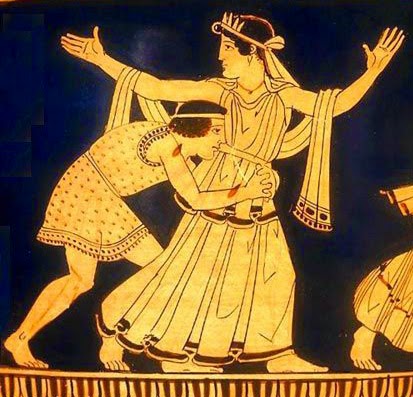
I fight (mortal) trying to capture his beloved Thetis (divine).
According to Greek mythology Tethys is one of the 50 sea nymphs, daughters of the god Nerean, known as the Nereids. Thetis was a nymph of great beauty whom the god Zeus wanted to marry the hero “Greek” I fight. Note that I put the word in quotation marks many times “Greek” since it remains to be seen…
But apart from this mythological and almost divine version of the origin of Achilles that the Greeks contributed from the 8th century to. C., What are the facts that tell us about the true origin of Achilles?… We are going to list them:
Investigations on the Thracian origin of Achilles.Archeologist Arthur Evans
At the end of the 19th century, most scholars were inclined to classify Achilles as of the Greek ethnic group. Fortunately, at the beginning of the 20th century, there were more progressive researchers who were not influenced by established beliefs and who strictly followed the facts. One of the first to conclude that the name Άχιλλεύς (Achilles in greek letters) It was not a name of Greek origin, it was the prestigious British archaeologist Arthur Evans (1851-1941).
But if Achilles was not Greek, Where he was from?, What are your true ancestors?… The same opinion that Achilles was not Greek is shared by the Flemish linguist Albert Joris Van Windekens (1915-1989). Declares that the name of Άχιλλεύς (Achilles) it is not a greek name, but a name pelasgo which is similar to the names of some rivers in the Thessaly region: Achelis , Άχελῶς . The Swedish linguist Hjalmar Frisk (1900-1984) also talks about pre-Greek origin ( pelasgo ) from the name Άχιλλεύς (Achilles) .
The Pelasgians are the predecessor peoples of the Hellenes as inhabitants of Greece and therefore prior to the arrival of the Greek language to the Aegean Sea. The German author Bernhard Giseke published in 1858 his work on his studies, stating that the language of the Pelasgians was the same as that of the Thracians (ancestors of present-day Bulgarians), which were the dominant civilization of the Balkan Peninsula at that time. Language “track-pelasgo”, as Bernhard Giseke called it, It was spoken in ancient times not only before the invention of the Greek language, but also in the Neolithic ( VII millennium BC).
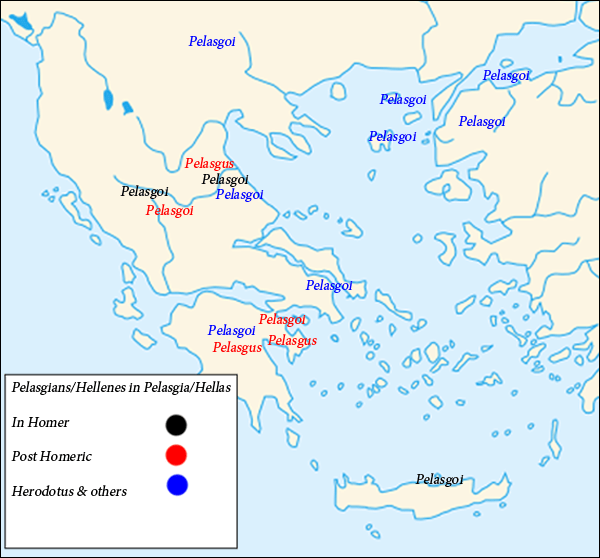
Location of the Pelasgians according to Homer, Herodotus and others
At the end of the Bronze Age, the pelasgians, remain in their native places, the territory from the river Struma in present-day Bulgaria to the southern Peloponnese (southern greece today). It is no accident that Pliny (famous roman writer and military man, 23 – 79 d.C.) state that the ancient name of the Peloponnese is Pelasgia (Source: Full . H . N . IV .9.). The father of Geography, Estrabуn, also states that the previous name of the Peloponnese was Pelasgia . The same author is convinced that Thessaly was really called Argos Pelasgiano , and the tribes that inhabit the region of Epirus are Pelasgians (Source: STRAB . V.2.4.). This information is in harmony with Herodotus himself, who lived before and who writes that the country called Greece was formerly known as Pelasgia (Source: Her . II .56).
In summary: during the Bronze Age, the Thracian-Pelasgians ruled the territory that today is called Greece . Strabo is extremely clear in stating that “in ancient times all Greece was inhabited by barbarians”, that is to say, Thracians, since Thrace was land “Barbarian” from the partial greek point of view… Strabo even gives accurate data explaining that all of Attica was ruled by the Thracians, and in the city of Delphi the Thracian king Tereo reigned. It also mentions that the Peloponnese is inhabited by Phrygians (people also related to the Thracian-Pelasgians), whose king, Pelops (Pelope, meaningful name in Thracian language but not in Greek) It is who gives name to the peninsula… Even Greek authors also name Agamemnon as the grandson of Pelops, therefore Agamemnon, King of Mycenae and leader of the Achaean armies against the Trojans had Phrygian ancestors, no greek origin.
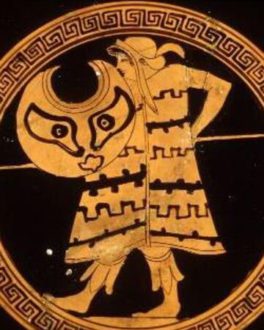
Greek pottery depicting a Thracian-Pelasgian
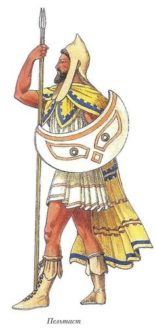
Reproduction of Thracian-pelasgic clothing
Thanks to the fact that the Phrygians (let"s remember: descendants of the Thracians) ruled the Bosphorus Strait, and that of the Dardanelles, They managed to earn enormous wealth. It was these riches that caused the outbreak of the Trojan War, if it really was produced… A war between relatives: Thracian-Pelasgians who ruled the lands of present-day Greece against the Phrygians (also Thracians) that dominated the West of present-day Turkey. It is not the first time in history that there is a war between populations of the same ethnicity and culture, nor would it be the last…. Therefore this war, if it occurred, It was not because of the flight of the beautiful Helena with the Trojan Paris, if not for the commercial competition between the Thracians on the East and West Aegean coasts… Of course for Homer, who was more poet than historian, and for the many followers of Greek mythology, is much more “poetic and romantic” seek as a cause of the Trojan War the love between Helen and Paris than the simple fact of battling for commercial power in the region…
Helen of Troy and Prince Paris (notice Paris with the typical Thracian-Phrygian cap)
Even after this 12th century BC conflict. (either military or just commercial) and until the 8th century BC., the Thracians continued to be masters of the seas and lands surrounding the Aegean Sea. The authentic Greeks, They came from North Africa in the 2nd millennium B.C., and they were under the rule of the Thracians all those centuries (It is the dark ages mentioned above and purposely forgotten by ancient Greek historians). For centuries the Greeks were not able to overcome the strong cultural and military current that comes from the Black Sea. Only after the fall of the Phrygian Kingdom under the blows of Assyria in present-day Turkey, It was when the true Greeks learned to build ships good enough to begin the colonization of the Aegean Sea and the lands that surround it..
The Pelasgian origin (tracking) Achilles explains many things. And not only does the ancient hero"s name have no meaning in Greek. The same goes for his mother"s name Θέτις / Aunt . Professor Hjalmar Frisk was again clear and concise: ” The identification of Thetis as a Pelasgian character is necessary” (” The detour via the Pelasgian hardly seems necessary ” ).
Orpheus enchanting the animals with music (notice again, wearing the typical Thracian hat).
Of course, the name of Πηλεύς / Peleus / I fight, Achilles father, it is not greek either. Suffix – εύς in Greek language is an indication of the foreign origin of the word. And we have other examples with this suffix: It is more than clear that Oρφευς / Orfeo, it is not a greek name, sino tracking, as the Russian linguist Yuri Otkupshchikov (1924-2010) pointed out some time ago. We also mentioned earlier that Strabo spoke of the Thracian king Tereo as ruler of the city of Delphi.. As well, tereo, oh Tereus, it is written in greek:Keep it , again with the suffix -εύς (that is to say, is a foreign name, not greek).
Definitive proof of the Thracian origin of Achilles.But not only the discipline of toponymy and the studies of authors mentioned above support the fact that Achilles was not Greek but Thracian-Pelasgian. There is other evidence of the Pelasgian origin of Achilles. During late Antiquity, but especially in the early Middle Ages, many things related to the origin of the characters in the Iliad were hidden. Nevertheless, the truth cannot be destroyed. The ancient images of Achilles remain and are quite different from the traditional. The images that have been preserved from the myth of Achilles on Greek frescoes or ceramics are idealized by the ancient Greeks because they were drawn many centuries after these events occurred.
The myth of Achilles in Greek ceramics of the s. VI a.C.
However in the early twentieth century, in 1908, several volumes of books were published in Germany on the culture of the ancient Hellenic civilization: “The Hellenic culture” with amazing and mysteriously forgotten ancient Achilles drawings… Los autores Fritz Baumgarten, Franz Poland and Richard Anton Wagner publish beautiful but little known images of statues in them, fresh, etc. from the time when the Trojan War supposedly occurred. Among the unique drawings are also those of Achilles. One of them has a special importance for history because the young hero is represented with his head shaved from behind leaving a lock of long hair on top, that is to say, a quiqui.
Drawing of the young Achilles contributed by 3 authors of “The Hellenic culture”.
Shaving the head and leaving a lock was not a typical Greek custom , but something practiced by the Thracians and Pelasgians belonging to their community. Plutarch tells us about Theseus" special hairstyle (which is not a Greek name either: Θησεύς sino tracio-pelasgo) and explains why the Thracian tribes of Abantes and Mizis shave part of their hair and let another part grow freely (source: Pleased. He .5.1), which the Greeks did not do. According to Plutarch, shave the head from behind, leaving only a strand above, has the mission that in the melee fight the enemies cannot hold them by the hair attacking from the back, thus avoiding a weak point.
 The founder of Athens according to Greek mythology, Teseo, has long been considered greek, but those who read Plutarch are aware of Theseus" Thracio-Pelasgian origins. The old author explains that Theseus" maternal line came from the Phrygian Pelops family, while his paternal line belonged to Erecteo and the indigenous population of the country: the Pelasgians or the firstborn of the earth, as Plutarco calls them (source: Pleased. He .3.1).
The founder of Athens according to Greek mythology, Teseo, has long been considered greek, but those who read Plutarch are aware of Theseus" Thracio-Pelasgian origins. The old author explains that Theseus" maternal line came from the Phrygian Pelops family, while his paternal line belonged to Erecteo and the indigenous population of the country: the Pelasgians or the firstborn of the earth, as Plutarco calls them (source: Pleased. He .3.1).
Head of a Phrygian warrior found in the lands of Asia Minor showing the head shaved with just one quiqui. Source: http://www.veda.harekrsna.cz/connections/img/god-sikha.jpg
By Homer and Strabo, we know that Minoan Crete was inhabited by Thracian-Pelasgians, who are even called gods for their superior culture and wisdom. Thanks to the surviving frescoes from the Bronze Age, we know how the Pelasgians were physically. Certain individuals are depicted with a shaved head and one or more quiqui. Thus, in addition to the written testimony of Plutarco, we also have material evidence that the Thracian-Pelasgians, or more precisely certain groups of them, they shaved their heads and wore quiquis, Just like Achilles!!.
Minoan frescoes from Santorini depicting shaved-headed Pelasgian warriors and quiquis. R"s Photos. van Zandt.
The survival of the drawing that represents Achilles with a quiqui is really a miracle. The enemies of this uncomfortable truth were aware of facts that were quite inconvenient to them., since the beginning of the 20th century. They knew about the Thracian-Pelasgian origin of Theseus, I fight, Thetis and Achilles, as well as the fact that the Thracian-Pelasgians wore a quiqui. At the same time, they saw how the Bulgarians, even up to the Middle Ages, they had retained the custom of their Thracian ancestors to wear quiqui and the rest of their hair shaved. This caused panic among followers of the lies of classical Hellenic culture..
Any evidence linking the roots of classical Hellenic culture to the northern regions of Greece (current Bulgaria, Macedonia, Albania…) has had to be destroyed by the enemies of “the truth”, and in fact many things have been erased. We are talking about chronic inconveniences, as well as statues, epigraphic monuments, etc. destroyed once the Greeks had supremacy over the Aegean Sea from the 8th century BC. The Ottoman occupation of almost 5 centuries between the end of the 14th century and the end of the 19th century of the Bulgarian lands also produced great destruction of the ancient Thracian remains. The 2 contemporary world wars and the subsequent communist era up to 1990 have kept Bulgaria silenced for centuries, but now some scholars raise their voices and claim the importance of Thracian culture and civilization in the development of Europe, like the first civilization, before the Greek and the Roman…
Some countries have built a prestigious and tourism industry, appropriating the achievements, deities and heroes of the ancestors of the Bulgarians. Lobbyists in these countries will continue to zealously defend the status quo, because if it is violated, the consequences would be serious for them, both in terms of finances and image… We end as we begin, with a phrase that makes you think, enunciated by the American writer, Pulitzer Prize winner, Upton Sinclair (1978-1968) what did he say: ” It"s hard to get a man to understand something, when your salary depends on you not understanding “…
Please leave your comment or opinion below, in section “Send a reply”. Commenting on the myth of Achilles is free, cheer up…
Author of the article: Luis Carro.
Article Source: linguist and historian Pavel Serafimov.
Bibliographic references:
1. Greek Sources for Bulgarian History, volumen II , edited by Iv. Duychev, G. Tsankova-Petkova, V. Tapkova-Zaimova, L. Yonchev, P. Tivchev, ed. Alabama. Burmov, Bulgarian History Institute , LOW, Sofia, 1958;
2. St. Mihailov, Towards the interpretation of the complex sign IYI and the expression Mednoto Gumno, Notices of the National Museum in Varna 23 (28), Georgi Bakalov Publishing House, Varna, 1987;
3. Yu.V.Kotkupschikov, Dogrechesky substrate in the origins of European civilization, Ed. Leningrad University, Leningrad, 1988;
4 . Estrabуn, Geography, transl. HL Jones, ed. GP Goold, books 6-7, THE CLASSIC LOEB LIBRARY, Harward University Press, London, 1995;
5 . W. Smith. A Dictionary of Greek and Roman Biography and Mythology. John Murray: impreso por Spottiswoode and Co., New-Street Square y Parliament Street, London, 1873;
6 . A. Evans, SCRIPTA MINOA II, The written documents of Minoan Cretan with special reference to the Knossos archive, vol. II, Oxford, Clarendon Press, 1952 , p. 67 ;
7. AJ Van Windekens, The Pelasgic, Essay on a pre-Hellenic Indo-European language, University publications, Louvain, 1952;
8. H.Fisk, etymological Greek Woerterbuch. Heidelberg, 1960;
9. Hellenistic culture by F. Baumgarten, F. Poland, R. Wagner, Second edition, BG Teubner Verlag, Leipzig and Berlin, 1908;
10. Plutarch, Parallel life, The life of Theseus, publ. And full. I de la Loeeb Classical Library Edition, 1914.
Ахглийският текст :
https://www.senderismoeuropa.com/en/Achilles-and-the-Trojan-War-Myth/
Розмарин – универсалната билка, преобраз...
Дългогодишните наши съюзници от Второто ...
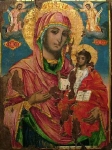
2. бъди българин
3. geravna
4. zeravna
5. zeravna
6. virginia grotta
7. Виртуална библиотека
8. Къде сте
9. Песен за Нибелунгите
10. Войни на Тангра

